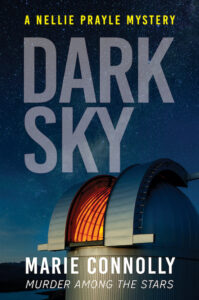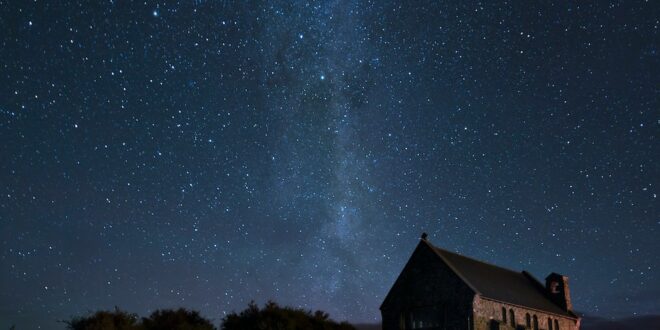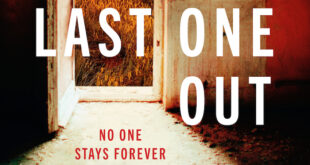I have often wondered what draws people to crime novels. I enjoy them myself and have, over the years, read across the spectrum from cosy crime to the grim realism of the pathological serial killer sub-genre. But like an increasing number of crime novel enthusiasts, I’ve found the cosy sub-genre to be the most satisfying. For me these books bring order and meaning to the uncertainties and challenges of modern life. There is something satisfying about solving the puzzle of an intellectually challenging mystery where the resolution rests in the hands of people we can trust and relate to. So when I retired from my academic position at the University of Melbourne in 2019 I thought it was the perfect time for me to think about writing my first crime novel.
This month, after two years in the making, Dark Sky has now been published by Quentin Wilson Publishing. It is set at the Mt John Observatory near Lake Tekapo, deep in the heart of the beautiful McKenzie Country. A professor of astronomy is found dead in a Mt John’s telescope dome and criminal psychologist Nellie Prayle is called upon to assist the police investigation. As she delves into an academic world full of ambitions, rivalries and infidelities, she discovers that the Dark Sky Reserve has more than its fair share of dark secrets.
Inspired by Agatha Christie’s Golden Age of the whodunnit – but with a modern slant – I wanted Dark Sky to create the thrill and excitement of the investigation in an intriguing setting. My professional life had given me insights into the criminal mind and an understanding of what motivates people to do the things they do. After thirty years as an academic, I had written many books and had a good feel for university life. I also enjoyed stargazing at the Mt John Observatory, an important experience that first suggested the potential for a murder mystery in the isolated environment of the Dark Sky Reserve. While my trips to the observatory were fascinating, it soon became clear a couple of stargazing visits wasn’t enough to prepare for writing a novel about Mt John and the astronomers who work there. I needed to know much more about them, the research they undertake and the history of New Zealand’s premier research observatory.
This took me to John Hearnshaw and Alan Gilbert’s celebratory book of the observatory, Mt John: The first fifty years. I read it from cover to cover… more than once. Not only did it give me essential information about the history of the observatory and the people who worked there, it also suggested the timing for the novel – the occasion of the fifty year celebratory conference in May 2015. In Agatha Christie-style, this gave me a gathering place for my characters and plenty of suspects, all with sufficient motive, opportunity and the means to commit the murder. Once I had a synopsis for Dark Sky in place, I contacted my old friend, the late William Tobin, who had been the Director of the Mt John Observatory in the 1990s and had retired to live in France while remaining active in astronomical research. William was delighted and intrigued by the prospect of staging a murder at Mt John. In 2015 he’d attended the actual anniversary conference in Tekapo, and he immediately sent me dozens of photographs and documents of the celebration – the venues, the observatory, the telescope domes, as well as the conference order of proceedings and all the idiosyncrasies needed to bring a large group of academics together to celebrate the Observatory’s 50th birthday. I couldn’t have received a better gift from William and I was really starting to get a feel for Dark Sky, its setting and its people. So far so good, but inevitably gaps in my knowledge persisted, and I was acutely aware I needed to know more about the procedural aspects of homicide policing.
It has often been said readers of crime have high expectations the writer will get the contextual facts right in a murder mystery. According to Lee Child, who wrote the hugely popular Jack Reacher series, readers waste no time in letting him know when he has made even the slightest error. I expect this might be the case with other internationally recognised authors. So my next area of research involved valuable time spent with local police. Patience personified, they explained homicide procedures to me. We grappled with the realities of police work alongside the need for me to reach a resolution in the novel far more quickly than would normally be the case in a real life. No matter how many hours I spent researching through the internet, nothing compared with my conversations with professionals who knew the intricacies of policing in the real world.
In lots of ways, embarking on a career of fiction writing in retirement has been a natural progression from my professional life. It has also been a sharp learning curve in both the writing and publishing process. There is a formality of writing academic non-fiction, at least to some degree, I needed to unlearn. At the same time, cosy crime brings a discipline all of its own – a truly novel experience Nellie Prayle and I will be grappling with in her next adventure!
 Dark Sky by Marie Connolly, Quentin Wilson Publishing, RRP $37.99
Dark Sky by Marie Connolly, Quentin Wilson Publishing, RRP $37.99









Join the Discussion
Type out your comment here:
You must be logged in to post a comment.